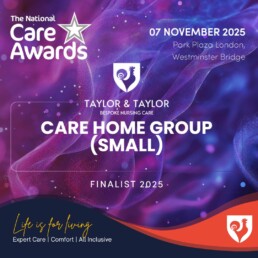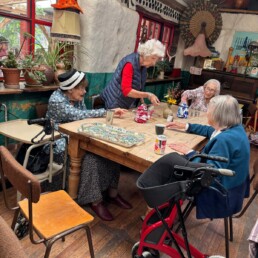The Role of Music and Art in Dementia Care
Dementia is a progressive condition that affects memory, cognitive function, and daily life. While medical treatments can help manage symptoms, creative therapies such as music and art have been proven to enhance emotional well-being and stimulate cognitive abilities in those living with dementia.
At Shipston Lodge, we incorporate these therapies into our care approach, providing meaningful engagement for residents.
The Power of Music in Dementia Care
Music has an extraordinary ability to evoke emotions and trigger memories, even for those with advanced dementia.
Studies have shown that familiar songs can help residents recall past experiences and reconnect with their identity.
Some of the ways we use music therapy at Shipston Lodge include:
- Personalised Playlists: We curate playlists with residents’ favourite songs, often linked to significant moments in their lives, bringing comfort and a sense of familiarity.
- Live Performances: Regular visits from musicians and choirs create a joyful atmosphere, encouraging residents to sing along and enjoy the rhythm.
- Interactive Sessions: Group music activities, such as drumming circles and sing-alongs, help promote socialisation, movement, and mental engagement.
- Music and Movement: Simple exercises set to music encourage physical activity, improving coordination and reducing agitation.
By integrating music into daily routines, we help reduce anxiety, enhance mood, and provide a calming environment for our residents.
The Impact of Art Therapy on Dementia
Art therapy offers a unique way for individuals with dementia to express themselves, particularly as verbal communication becomes more challenging. Engaging in creative activities can provide a sense of accomplishment and boost self-esteem.
At Shipston Lodge, we encourage residents to take part in:
- Painting and Drawing: These activities allow residents to explore their creativity, regardless of skill level. The process is more important than the outcome, fostering engagement and relaxation.
- Crafting Sessions: Making collages, clay modelling, and card decorating stimulate fine motor skills and allow residents to create something meaningful.
- Sensory Art: Using different textures and materials, such as fabric, sand, and watercolours, helps engage residents’ senses and provide therapeutic benefits.
- Storytelling Through Art: Creating visual art can help residents communicate emotions and memories, offering an alternative form of self-expression.
These creative experiences enhance cognitive function, improve mood, provide relaxation, and encourage social interaction.
Enriching Lives Through Creativity
At Shipston Lodge, every resident should have the opportunity to experience joy, connection, and fulfilment. Music and art therapies are key components of our holistic approach to dementia care, allowing residents to engage in meaningful activities that bring comfort and stimulation.
By embracing these creative therapies, we continue to foster a supportive, engaging, and joyful environment for our residents, ensuring they feel valued and connected daily.
Related News
Taylor & Taylor Care Named Finalist at National Care Awards 2025
Proud to Be Finalists: Taylor & Taylor Care Shortlisted at the National Care Awards 2025 At…
Check out our August Social Media posts
Afternoon Delights at Wychford Potteries & Café! What a…
Using Aromatherapy and Natural Remedies in Care Settings
Using Aromatherapy and Natural Remedies in Care Settings Incorporating natural remedies into care…
Emergency Preparedness in Care Homes: Keeping Residents Safe
Emergency Preparedness in Care Homes: Keeping Residents Safe In a care home setting, safety is not…
Sleep and Ageing: How to Promote Restful Nights in Later Life
Sleep and Ageing: How to Promote Restful Nights in Later Life As we age, the quality and patterns…
Check out our July Social Media posts
Musical Fun with Kidley Divey We had a fantastic and energetic…
Why Location Matters: The Benefits of Life in the Heart of Shipston-on-Stour
Why Location Matters: The Benefits of Life in the Heart of Shipston-on-Stour The location of a…
Staying Connected: How Shipston Lodge Helps Families Stay Close
Staying Connected: How Shipston Lodge Helps Families Stay Close Moving into a care home is a…
Life Stories and Legacy: Celebrating Residents’ Histories at Shipston Lodge
Life Stories and Legacy: Celebrating Residents’ Histories at Shipston Lodge At Shipston Lodge, we…
Adapting to Changing Needs: How Shipston Lodge Evolves with Each Resident
Adapting to Changing Needs: How Shipston Lodge Evolves with Each Resident At Shipston Lodge, we…
Creating Moments of Joy: The Role of Laughter and Play in Elderly Wellbeing
Creating Moments of Joy: The Role of Laughter and Play in Elderly Wellbeing Laughter is more than…
Empowering Independence: How Shipston Lodge Supports Choice and Autonomy
Empowering Independence: How Shipston Lodge Supports Choice and Autonomy Independence is something…











